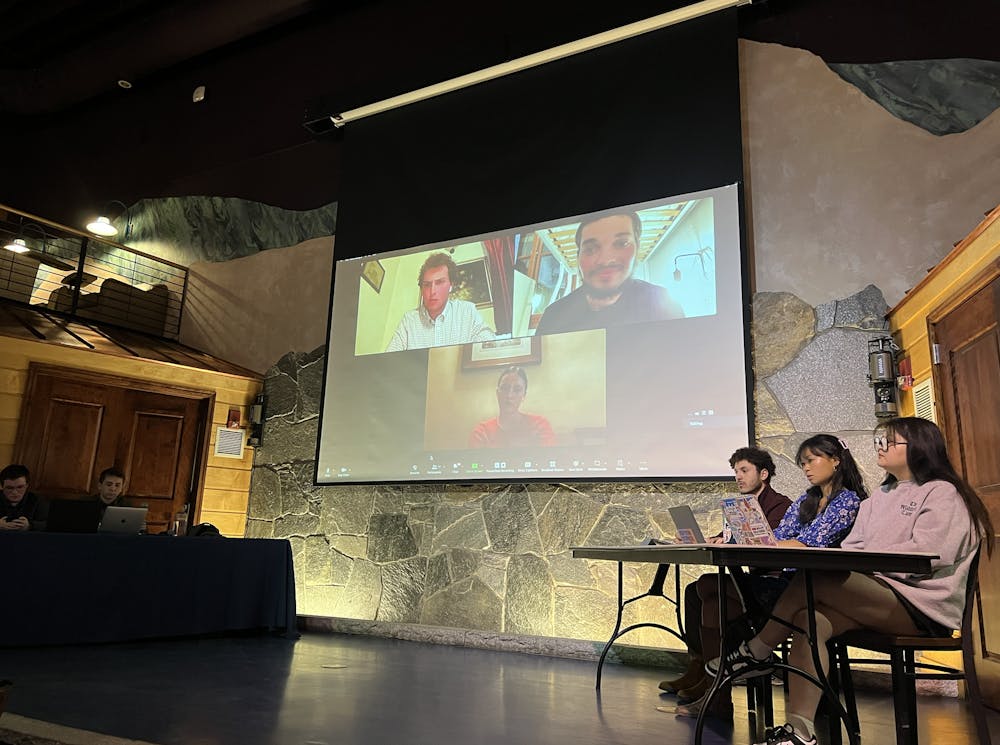The Student Government Association (SGA) and The Middlebury Campus hosted the annual presidential debate for the 2024-2025 academic year in Wilson Café on April 9, co-moderated by Campus editors Ryan McElroy ’25 and Shane Silverman ’24.5. Voting for the election, and for SGA class senators, will open via Presence at noon on April 11 and will close at midnight on April 13.
The two candidates competing for the presidency, Josh Harkins ’25 and B Striker ’25, debated each other on a Zoom call, which was projected onto the main screen in Wilson in front of an audience of approximately 30 people.
Freddi Mitchell ’25, one of Harkins’ running mates, also participated in the debate through Zoom. Talia Chang ’26, Daniza Tazabekova ’26 and Ahmed Awadallah ’26 — Striker’s two vice presidential candidates and Harkins’ other vice presidential candidate, respectively — were in person on the debate stage.
Beginning the debate at 6 p.m., McElroy and Silverman briefly outlined the rules of the debate and Abed Abbas ’24, the current SGA president, provided a short opening statement.
In his statement, Abbas referred to his year leading the SGA as a “building year,” noting that working within the SGA yields a mixture of failures and successes, but is always rewarding.
One question posed to the candidates asked about SGA’s partnerships with other groups: “To succeed, the SGA must collaborate with many different partners on campus. Can you describe which groups will be most important for you to work with and how you will work with them?”
Responding first, Harkins emphasized the importance of soliciting information and perspectives from students on-campus, and referenced the Middlebury College Activities Board (MCAB) and club sports organizations as groups with which his administration would work.
Striker’s response reiterated the importance of communicating with MCAB and establishing channels of contact with faculty, staff and the administration.
“If we all just work together, it will be easy,” Striker said.
Another question referenced data from last year’s Zeitgeist 5.0 survey that reported overwhelming student ambivalence and dissatisfaction with the SGA, asking each candidate to relay their experience with SGA and their understandings of how SGA functions, along with how it would operate underneath their new leaderships.
Striker replied that his administration would create a “fun environment,” and cited his tenure as an SGA sophomore senator last year as experience working within the SGA that prepared him for his potential role as president.
“I do not have any experience with the SGA,” Harkins began his response, adding that he was likely one of the people that reported a dissatisfaction with the SGA in last year’s Zeitgeist survey, but was running to rectify that very issue.
Harkins went on to outline his administration’s plan to re-invigorate the power of SGA committees and SGA senators and to follow-up with the college administration to ensure SGA projects are not dropped over the course of the year.
Another question asked Harkins and Striker to elaborate on their proposed mental health policies, and to differentiate themselves from their opponent.
This question yielded similar responses from Harkins and from Striker, who deferred to Tazabekova to answer the question. Both candidates called for improved counseling systems and counselors that reflect the diversity of student identity and experience on campus, and not perpetual deflections to telehealth services. Tazabekova mentioned that, if elected, she, Chang and Striker plan to improve classroom accessibility so that student access to learning does not feel impeded.
Additional questions from McElroy and Silverman dealt with being away from campus. Both Striker and Harkins are currently abroad — Striker having been so for the whole academic year, with Harkins abroad since J-Term — and both responded that their current physical distance from the college is not a detriment to their campus literacy.
None of the four vice presidential candidates reported that they will be studying abroad for the 2024-2025 academic year.
The final question asked Harkins and Striker to state why they were better than their opponent.
“I am qualified because I am part of the community. That’s the only qualification that matters,” Harkins said. Both he and Mitchell emphasized the well-roundedness of their administration’s experience with on campus organizations, and the long-lasting relationships they have built with college administrators.
Striker’s response highlighted his various small business enterprises on campus, including “4Wheels,” a ride-sharing service he operated in 2021 and 2022 and “4Meals,” a tool that allows students to find people to sit with while eating in the dining hall. Chang described her experience as co-director of the SGA Diversity, Equity and Inclusion committee, which she said provided her with the lessons needed to be a successful SGA vice president.
After the main segment of the debate ended, the event opened up to questions from the audience.
Topics of these audience-submitted questions included the use of A.I. within the classroom and as it pertains to the Honor Code, how Harkins’ predominantly white administration will incorporate BIPOC voices, methods of bridging the social gap between athletes and non-athletes and the process required to form student clubs.
In their closing statements, both candidates reiterated their administration’s main proposed policies and encouraged students to vote in the election.
Striker re-outlined the four policy categories on which his administration is focused — Health, Community, Access and Transparency — and acknowledged the effort and dedication of Chang and Tazabekova.
“It is our future,” Striker said. “Vote for the future you want to see.”
“My administration is running to solve the community crisis,” Harkins said in his closing statement. Like Striker, he commended the work of Mitchell and Awadallah as vice presidential candidates, and reminded students to cast a vote in the SGA election.
“No matter who you vote for, please vote,” Harkins said. “The only way that we can make this school better is with more participation and more voting.”

Cole Chaudhari '26 (he/him) is the Senior News Editor.
Cole has previously served as a Managing Editor, News Editor, Copy Editor, and Staff Writer. He is majoring in History and English Literature, and spends his time outside of the newsroom reading about sound reproduction technologies and making field recordings. This past summer, he taught high schoolers at a summer program at a boarding school in New Hampshire.




